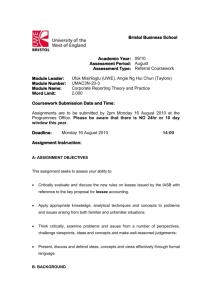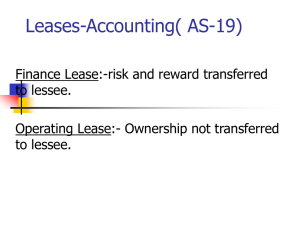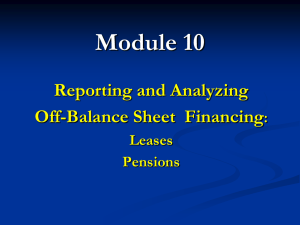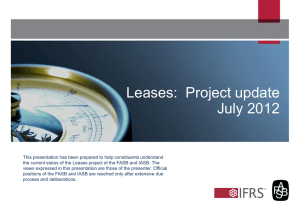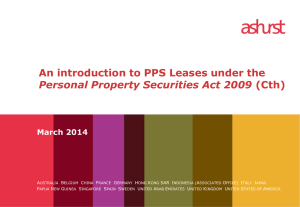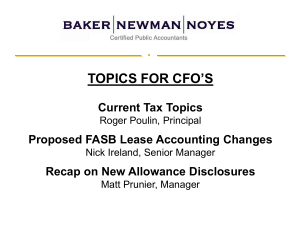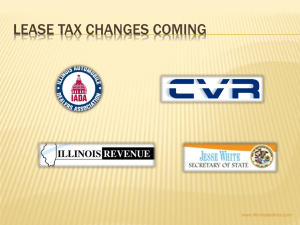Questions and Answers
advertisement
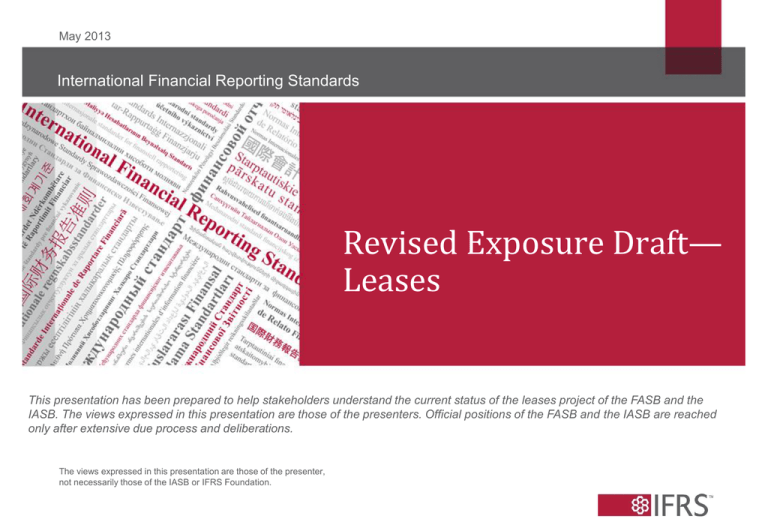
May 2013 International Financial Reporting Standards Revised Exposure Draft— Leases This presentation has been prepared to help stakeholders understand the current status of the leases project of the FASB and the IASB. The views expressed in this presentation are those of the presenters. Official positions of the FASB and the IASB are reached only after extensive due process and deliberations. The views expressed in this presentation are those of the presenter, not necessarily those of the IASB or IFRS Foundation. Presenters for Today’s Webcast Darrel Scott, IASB member Patrina Buchanan, Technical Principal Sarah Geisman, Technical Manager 2 Housekeeping Items 3 • Download slides by clicking on the button below the slides window • Ask a question by typing into the designated text box on your screen and clicking “submit” • Remember to turn off your pop-up blocker • A webcast recording will be available online at www.ifrs.org for 90 days Leases ED is Available 4 • The documents are available online at www.ifrs.org • The comment period ends on 13 September 2013 • Send comments electronically to the IASB website (www.ifrs.org) using the “Comment on a Proposal” page Agenda • Background • Lessee accounting • Lessor accounting • Other aspects • Next steps 5 Why a Leases project? Lessee • Most assets and liabilities are offbalance-sheet • Limited information about operating leases Lessor • Lack of transparency about residual values • Consistency with lessee proposals and revenue proposals 6 $1.25 trillion of off-balancesheet operating lease commitments for SEC registrants* * Estimate according to the 2005 SEC report on off-balance-sheet activities How the proposals are an Improvement Existing accounting issues Lessee Most assets and liabilities are offbalance-sheet Insufficient disclosure Lessee about operating leases Lessor Lack of transparency about residual values of equipment and vehicles How the proposals address the issues Recognition of lease assets and liabilities for all leases of more than 12 months Enhanced disclosure requirements Separately account for residual asset Enhanced disclosures about residual asset’s exposure to risk 7 How the proposals are an improvement Greater transparency about leverage, assets used in operations, and cash flows Greater transparency about residual values Proposed right-of-use model 8 A lease contract conveys the right to use an asset (the underlying asset) for a period of time in exchange for consideration Right-of-use asset Lessor Lessee Lease payments Dual approach 9 There is a wide spectrum of lease transactions with different economics Start of lease End of lease Most equipment/ vehicles Asset consumption more than insignificant Most real estate Asset consumption not more than insignificant Lease classification test Leases for equipment/vehicles are Type A leases unless • Lease term is insignificant relative to total economic life of asset • Present value of lease payments is insignificant relative to fair value of asset 10 Leases for real estate are Type B leases unless • Lease term is major part of remaining economic life of asset • Present value of lease payments is substantially all of fair value of asset Lessee accounting model Balance sheet Type A Type B Most leases of equipment/ vehicles Right-of-use asset Lease liability Most leases of real estate Right-of-use asset Lease liability 11 Income statement Amortisation Interest expense Single lease expense on a straight-line basis Cash flow statement Cash paid for principal and interest payments Cash paid for lease payments Lessee disclosures Qualitative General description of leases Terms of: - variable lease payments -extension/termination options -residual value guarantees 12 Quantitative Judgements & Risks Maturity analysis of undiscounted cash flows for each of first 5 years plus total thereafter Nature and extent of risks arising from leases Reconciliation of lease liability* Restrictions and covenants Expense relating to variable lease payments Information about leases not yet commenced Reconciliation of right-ofuse asset by asset class Significant assumptions and judgement Lessor accounting model Balance sheet Type A Type B Most leases of equipment/ vehicle Lease receivable Residual asset Most leases of property Continue to recognise underlying asset 13 Income statement Cash flow statement Interest income and any profit on the lease Cash received Lease income, typically on a straight-line basis Cash received Lessor disclosures Qualitative Quantitative General description of leases Reconciliation of lease receivable and residual asset 14 Judgements & Risks Nature and extent of risks arising from leases Table of lease income Terms of: -variable lease payments -extension/termination options -purchase options Maturity analysis undiscounted cash flows for each of first 5 years plus total thereafter Carrying amount of residual assets covered by residual value guarantees Significant assumptions and judgement Risk management for residual assets Reducing Cost and Complexity in Response to Feedback on the 2010 ED Short-term leases • Option to exclude leases with a maximum term of 12 months or less Variable lease payments • Excluded if payments are not linked to an index or a rate Renewal options • Excluded unless significant economic incentive to exercise the option 15 Next steps 16 Revised EDMay 2013; Comment period ends13 September 2013 OutreachMay through October 2013 Redeliberationsbeginning Q4 2013 Final standard and effective dateTBD Questions and Answers 17 Questions and Answers if readers already make an adjustment why is the change needed? 18 Questions and Answers can you explain the difference between the 'right of use' vs 'the right to control the use' definition of a lease and where you see the change in scope impacting current lease arrangements? 19 Questions and Answers Has the Board considered the issue of owned assets where parts of the whole asset are depreciated at different rates where they have different useful economic lives. How can this be applied to Type A right of use assets, or the previous 'finance leased assets' which in theory should have an amortisation profile similar to a purchased asset? 20 Questions and Answers what is ´more than insignificant´? It was promised more guidance would be included in the new Exposure Draft? 21 Questions and Answers Commercial lease agreements in real estate in EMEA are normally subject to at least an annual indexationbased on defined price indices. Will the lessee have to forecast the increase to account for it? 22 Questions and Answers Anymore guidance on "significant economic incentive" to be applied for assessing the renewal of options? 23 Questions and Answers Can you provide rationale for the proposed treatment of "deferred profit" for lessor’s R&R model? 24 Questions and Answers Do lessors who elected the short-term lease exception need to derecognise the underlying asset at the commencement date? 25 Questions and Answers What happens if you are under a Lessor model and the underlying asset is normally amortised under the unit of production method? 26 Questions and Answers Does the lessee include interest rate from the lessor or their own internal borrowing rate? 27 Questions and Answers If lessor is of a type B lease do you have to derecognise the asset - you mentioned short term leases but not all type b 28 Questions and Answers Do you expect a difference in identifying whether an arrangement contains or is a lease as under the current IFRIC 4? 29 Questions and Answers equipment/vehicles...will they be defined? 30 Questions and Answers Has the risk that the option to exclude short term leases with a maximum term of 12 months will lead to lease structuring opportunities to avoid the accounting required by the proposed standard been considered by the Board? 31 Questions and Answers How do you expect these proposals to feed into SME accounting 32 Questions and Answers Which effective date can be expected in the new standard? 33 Questions and Answers What are the proposals for the treatment of subleases? 34 Questions and Answers We are lessor of containers to more than 200 customers around the world. Each customers have more than 20 lease contracts. How does the ED expect us to disclose all contract terms in the audited accounts ? Thanks a lot 35 Questions and Answers On renewal options, there is an opportunity to leave these out if "does not show incentive" for lessee to exercise. Is there a threshold for this, dollar amount for or definition of incentive? 36 Questions and Answers Please elaborate on impairment test for lease receivable and residual asset. 37 Questions and Answers Are there any guidelines on Type B for real estate long leases - eg. 99 year leases. Will these be treated more like owned properties? 38
